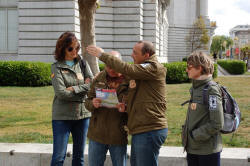Nominal clauses
 |
| Do you know when the next train is due? |
The second clause in the sentence above is a nominal clause. It acts, in this case, as the object of the verb know. If you are unsure about the nature of clausal analysis, there is a guide on this site.
The usual way to analyse this question for learners is to refer to it as an indirect question (to which there is also a guide on this site) but there is an alternative view and that is what we are concerned with here.
 |
What is a nominal clause? |
Simply put, a nominal clause is a
clause functioning grammatically as a noun.
There are a number of different sorts of these and we are concerned
with five of them here.
As a first mini-task, spot the clause which is acting as a noun in the following:
- I don't think stealing in order to eat is wrong.
- What you need to do is open the tap fully.
- I want to come to the wedding.
- I didn't see whoever did the damage.
- I told him he was wrong.
Click here when you have spotted the nominal clauses.
- I don't think stealing in order to eat
is wrong.
In this case, we have a non-finite -ing clause acting in two ways:
it is the object of the verb think
and
it is the complement of the adjective wrong. - What you need to do is open the
tap fully.
Here, we have another non-finite clause, open the tap fully, acting as the complement of the verb be. It is a bare infinitive nominal clause.
We also have a wh-clause, what you need to do, acting as the subject of the verb. - I want to come to the wedding.
This is slightly simpler. We have a to-infinitive acting as the object of the verb want. - I didn't see whoever did the damage.
Not quite so simple. In this case, the clause, whoever did the damage, is a nominal relative clause. It is still a wh-clause. - I told him he was wrong.
In this one, we can insert the word that without any change in meaning. The way to think is to call it a form of that-clause without the word that. In other words, it's a zero-that clause. If you make the clause the subject of the sentence, it is impossible to omit the word that:
That he was wrong is what I told him.
*He was wrong is what I told him.
 |
Characteristics of nominal clauses |
There are some general characteristics of all nominal clauses:
- As we saw above with the initial examples, nominal clauses can act in place of noun phrases in many circumstances. So we have, for example:
- Most nominal clauses cannot usually operate as indirect
objects but a nominal relative clause can do so so we allow,
e.g.:
Give whoever asks the same answer - Some nominal clauses can act as complements of prepositions:
From what he told her, she assumed I was coming
They talked about who to invite
They argued over spending all that money on a new garage
She was disappoint by what he had to say
They travelled without buying a ticket
But that-clauses and to-infinitive clauses cannot do this so, e.g.:
*We were surprised by that he had lived in Spain
*They travelled without to buy a ticket
are not allowed (but may be in other languages).
 |
Nominal -ing clauses |
| Eating too many chips is bad for you |
Traditionally, teachers have told learners that this is something called a gerund and, indeed, there are times when that explanation will do. For example, in clauses such as:
- I enjoy fishing
- Fishing is a relaxing hobby
- His favourite hobby is fishing
- I'm tired of fishing
- His hobby, fishing, takes up all his time
In sentence 1: the verb clause is acting as the object of
enjoy.
In sentence 2: the verb clause is acting as the subject of the
copular verb be.
In sentence 3: the verb clause is the complement of the copular verb
be.
In sentence 4: the verb clause is the complement of the preposition
of.
In sentence 5: the verb clause is operating in apposition to the
noun phrase his hobby.
In all five instances, the -ing clause can be replaced by a simple noun, e.g., football. Traditionally, therefore, we can call them gerunds.
However, the situation is complicated by a number of factors.
- The -ing clause can also act as the complement of
an adjective phrase as in, e.g.:
She and her colleagues were extremely busy preparing the presentation.
and it is difficult there to see how a simple noun can be substituted for the -ing clause. We can't have, e.g.,
*She and her colleagues were extremely busy preparation of the presentation.
It is, therefore, a participial clause rather than a gerund. - The use of the genitive or the object case. For
example, we can have both:
She was surprised by my getting so angry
and
She was surprised by me getting so angry (informal)
In the first case, we can replace the verb with a simple noun:
She was surprised by my anger
but in the second case, we can't:
*She was surprised by me anger
so the verb is not acting purely as a noun in that case. To call it one is misleading.
When the subject of the sentence is inanimate, the case becomes even clearer:
We can have:
Her having done the calculation, we assumed it was OK
and
Mary's having done the calculation, we assumed it was OK
or
She having done the calculation, we assumed it was OK
and
Mary having done the calculation, we assumed it was OK
and
The computer having done the calculation, we assumed it was OK
but, we can't have
*The computer's having done the calculation, we assumed it was OK
or
*Its having done the calculation, we assumed it was OK
Again, in the last two examples, the -ing clause is clearly not acting as a noun. It is not, in other words, a gerund at all.
The safest option is probably to call this construction a nominal participle clause and leave it at that, without confusing our students (or ourselves) too much.
 |
Nominal bare infinitive clauses |
| The first thing he did was have breakfast |
This is a minor form of nominal clause but it is not
allowable in many languages and causes some difficulty in both
production and reception.
In the example above, there are two noun clauses connected by the
copular verb be. The function of the clause is to
provide more data about the verb do. That is how
these types of clause always appear.
As far as teaching the form is concerned, the first thing that needs to
be noticed by learners is that the to-infinitive can also
be used in the construction so we can have, for example:
The first thing he did was (to) have breakfast
The next thing he did was (to) drive to work
What we need to do is (to) go shopping
and so on.
However, the second issue is that when the clause functions as the subject, we must
omit the to:
Have breakfast is what I'll do first
is acceptable, if a little unusual, but:
*To have lunch is what I'll do later
is not.
 |
Nominal to-infinitive clauses |
| For a bridge to collapse like that is unbelievable (Leech et al, 1972:739) | |
These are much more common and cause much more serious problems for learners, especially concerning the role of the function word for.
Nominal to-infinitive clauses can perform a number of grammatical functions.
- In the example above, the clause is acting as a subject of the verb be.
- In, e.g.:
I want you to come early
The clause acts as the object of want. - In e.g.:
To be bilingual is to have a great advantage in life
We have two to-infinitive clauses, one acting as the subject of the verb be and the other as its complement. - In, e.g.:
Her hope, to come in first place, was realised
The clause is functioning in apposition to the noun phrase her hope. - In e.g.:
I will be happy to help with the arrangements
The clause is acting as the complement of the adjective happy.
the issue with for
When the clause acts as the subject, the
function word for frequently introduces it, as in, e.g.:
For him to be so
dim surprised me
The plan developed for
her to drive us all to the airport
For me to be asked to
do that is to ask too much
etc.
However, when the clause is the object of the verb, inserting
for is actually wrong so we can't have:
*They want for her to drive them to the airport
*They asked for me to do that
For speakers of many languages, even those which allow infinitive clauses to act in this way, this is deeply confusing and leads to consistent error.
 |
Nominal wh-clauses |
| They told me how to get there |
These kinds of clauses are extremely common. As was noted
at the beginning, they are commonly taught as indirect question
forms such as:
Can you tell me ...
where the stations is?
what time the
bus leaves?
when the train goes?
how to get to Margate?
who to
ask for directions?
etc.
However, they do not only occur as objects in indirect questions.
They can also be:
- Objects in affirmative statement as in the
example above:
They told me how to get there - Subjects as in:
Where it is all going to end up is the question - Adjective complements as in:
He was unsure where he was - Prepositional complements as in:
I asked them about where the party was - In apposition to nouns as in:
His question, who would do the work, remained unanswered
 |
yes-no nominal clauses |
| Do you know if you'll be late? | Do you know whether it'll be there? |
These operate in similar ways and can be seen as a sub-set of
wh-clauses.
They are formed in the same way as wh-clauses but, instead
of the wh-word, we use if or whether.
For example:
Do you know if the train is on time?
Can you tell me
whether this is the right bus stop?
It doesn't matter
whether we are late or not.
These clauses are almost always the objects of verbs although it is
possible to see them functioning in other ways, grammatically, such
as:
Whether he will be late is the
question (subject)
I am surprised if you believe that (adjective complement)
She thought over whether she should go (prepositional
complement)
There are complications to consider, which cause quite serious difficulties for learners:
- Both if and whether can be combined with
or to form alternative statements such as:
I can't see whether / if his help will make any difference or not.
I matters whether / if she comes or not - In alternative statements, if cannot be followed
directly by or not but whether can be used
this way so we can have:
She doesn't know whether or not she can come
and we can have:
She doesn't know if she can come or not
but we cannot have
*She doesn't know if or not she can come - In other (non-alternative) statements we can make a negative
with if but we can't do this with whether so
we can have
It is not important if you don't come at 6
but we can't have:
*It is not important whether you don't come at 6 - We can use whether in a clause acting as the
subject but we cannot use if in this way so we can
have:
Whether she comes or not is quite important
but we cannot have
*If she comes or not is quite important - Only whether can function in a prepositional
complement clause so we can have:
They spoke about whether they could do the work
but not:
*They spoke about if they could do the work
If wh-clauses are taught following this kind of analysis
then indirect wh-questions, yes-no indirect questions and
reported questions such as:
Could you let me know when he arrives?
Can you tell me if / whether he is coming?
and
She asked me where the hospital was
follow naturally.
 |
Nominal that-clauses |
| He told him that it would happen |
These are as common as wh-clauses and share many
characteristics and functions with them.
They are similar to wh-clauses in that they can act as:
- The subject:
That he will be late is certain - The object:
She assumed that he would arrive - The complement of the copular verb:
It appeared that he was late - In apposition to another noun:
Her assumption, that he would be late, proved right - As an adjectival complement:
She was certain that he would be late
But there are some differences and complications.
- When a that-clause is the object, we usually omit
the word that and make it a zero-that clause.
For example:
She told me (that) I was too early
He said (that) I was dead right
But, when the clause is the subject, we must include that as in:
That she was right was recognised immediately
but not:
*She was right was recognised immediately - These clauses cannot act as the complement
of a preposition so while we can have, e.g.:
He talked about having the work done
They talked over what to do
and
He was astonished by what came next
we cannot have:
*He talked about that he will have the work done
*They talked about that they had to do
*He was astonished by that it came next
In many languages, this restriction in use does not apply and that leads to a good deal of error. - The longer a clause is, the more likely we are to include
that or the listener / reader can get lost looking for
the clause. For example:
I hoped he would come
is fully acceptable with or without that but
I hoped, without much optimism based on his previous track record, he would come
is technically correct but difficult to follow and most native speakers would insert that to make:
I hoped, without much optimism based on his previous track record, that he would come
 |
Teaching nominal clauses |
You cannot plan to teach everything about nominal clauses in a
lesson or even a series of lessons but you can take each type at a
time and plan a series of lessons to cover them.
Much will depend on the level of the learners and the amount of
detail they can cope with.
Here are a few suggestions:
- At lower levels
- wh-clauses and yes-no clauses can be introduced via reported or indirect questions because the structural issues and functions are parallel. See the guide to indirect questions for more in this area including a link to a lesson on this site for B1 / B2 learners.
- that-clauses usually function as the objects of verbs or
the complements of adjectives and the structures are
parallel.
A way to introduce the ideas is via adjective complements and this can include all sorts of different clause types (but not all at the same time, please).
For example:
Given an introduction to a structure, the learners themselves can respond to pictorial prompts like this to make the correct structures.This might serve ... ... to introduce 
-ing clauses: Being on holiday made her happy
to-infinitive clauses: She was happy to have a holiday at last
that-clauses: She was happy that she was on holiday
wh-clauses: She loved where she was / what she was doing
-ing clauses: Having so many problems made her worry
to-infinitive clauses: She was sad to hear the news
that-clauses: She was sorry that she had to stay in the garden
wh-clauses: She hated where she was / what she was doing
From there, it's a short step to getting them to talk about themselves with sentences such as:
It makes me angry when ...
People doing XXX make me happy
I was happy that ...
One day, I would really love to ...
and so on.
Don't go on and consider the complications until the learners have mastered these simpler structures.
- At higher levels
- It is possible to combine the
teaching of nominal clauses as above but demanding more
complex sentences making the clauses perform different
grammatical functions such as:

Son, we need to talk about: + wh-, + -ing
They agreed + that, + wh-, + to-infinitive
They were worried + that, + about + complement nominal clause
etc. - It is possible to revisit areas
such as direct and reported speech and focus on the nominal
clause rather than the other structures (which will be
known). For example:
and so on.Reporting ... ... with a nominal clause like ... ... rather than the dull ... Can you tell me where the station is? She wanted ... (to know where the station was)
She wondered ... (if / whether I knew how to get to the station)
She wanted ... (me to direct her to the station)
She needed ... (directing to the station)
She asked about ... (getting to the station)She asked me where the station was Are we leaving soon? She asked about ... (leaving soon)
She was interested in knowing ... (whether / if we were leaving soon)
She clearly wanted ... (to leave soon)
It mattered to her ... (whether or not we were leaving soon)She asked if we were leaving soon
- It is possible to combine the
teaching of nominal clauses as above but demanding more
complex sentences making the clauses perform different
grammatical functions such as:
Whatever you do and whatever you teach, be aware that this is a
complicated area that needs careful handling.
Many of your learners' languages will not have parallel nominal
clause structures at all and, even if they do allow the use of
clauses in the place of nouns, their languages will almost certainly
work differently.
What is forbidden in English may be allowed in their languages and
vice versa.
There's a short test on this.
| Related guides | |
| wh- questions | for a guide to a related area |
| indirect questions | for a guide to using nominalised clauses in polite questions |
| tenses in dependent clauses | for a guide to a closely related area |
| clauses | for a guide to the fundamentals of clause analysis |
| verb and clause types | for a more technical guide to clause structures |
| catenative verbs | for more about the distinction between -ing forms and gerunds proper |
| relative pronoun clauses | for a guide which considers how these clauses work |
| relative adverb clauses | for a guide which also considers how wh-clauses can be nominalised |
Reference:
The above draws heavily, but not exclusively, on
Quirk, R, Greenbaum, S, Leech, G & Svartvik, J, 1972, A Grammar of
Contemporary English,
Harlow: Longman
